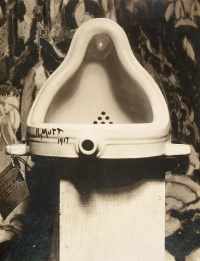Toilet
From The Art and Popular Culture Encyclopedia
| Revision as of 18:16, 27 January 2010 Jahsonic (Talk | contribs) ← Previous diff |
Current revision Jahsonic (Talk | contribs) |
||
| Line 1: | Line 1: | ||
| - | [[Image:La Toilette intime by Louis-Léopold Boilly.jpg|thumb|right|200px|''[[La Toilette intime (Boilly)|La Toilette intime ]]'' by [[Louis-Léopold Boilly]]]] | + | {| class="toccolours" style="float: left; margin-left: 1em; margin-right: 2em; font-size: 85%; background:#c6dbf7; color:black; width:30em; max-width: 40%;" cellspacing="5" |
| + | | style="text-align: left;" | | ||
| + | "Nothing is really beautiful but [[useless|that which cannot be made use of]]; [[Everything useful is ugly|everything that is useful is ugly]], for it is the expression of some need, and the [[Need|needs of man]] are [[vile]] and [[disgusting]], like his poor, weak nature.--The most useful part of a house is the [[toilet|privy]]."--''[[Mademoiselle de Maupin (novel)|Mademoiselle de Maupin]]'' (1835) by Théophile Gautier | ||
| + | |} | ||
| + | [[Image:Marcel Duchamp Fountain, 1917, photograph by Alfred Stieglitz at 291 art gallery following the 1917 Society of Independent Artists exhibit, with entry tag visible. The backdrop is The Warriors by Marsden Hartley..jpg|thumb|right|200px|''[[Fountain (Duchamp)|Fountain]]'' (1917) by Marcel Duchamp]] | ||
| + | [[Image:La Toilette intime by Louis-Léopold Boilly.jpg|thumb|right|200px|''[[La Toilette intime (Boilly)|La Toilette intime ]]'' by [[Louis-Léopold Boilly]]]] | ||
| {{Template}} | {{Template}} | ||
| - | A [[toilet]], plumbing fixture and disposal system primarily intended for the disposal of the [[bodily waste]]s. Before the 20th century, '''toilet''' universally referred to personal grooming, bathing and washing combing or arranging one's hair, shaving, etc., a sense preserved today in '''[[toiletry]]''' 'personal grooming item'. Nowadays, it is mostly used to indicate a [[lavatory]]. "Toilet of the mouth", however, is still is use by oral surgeons. | + | A [[toilet]], plumbing fixture and disposal system primarily intended for the disposal of the [[human waste]]. Before the 20th century, '''toilet''' universally referred to personal [[grooming]], [[bathing]] and [[washing]] [[combing]] or arranging one's hair, shaving, etc., a sense preserved today in '''[[toiletry]]''' 'personal grooming item'. Nowadays, it is mostly used to indicate a [[lavatory]]. "Toilet of the mouth", however, is still is use by oral surgeons. |
| + | == Toilet philosophy == | ||
| + | :''[[toilet philosophy]]'' | ||
| + | A number of [[philosopher]]s have been interested in [[excrement]] and can be considered -- not meant in a derogatory way -- '''toilet philosophers'''. Among them are [[Montaigne]], [[Georges Bataille]], [[Peter Sloterdijk]] and [[Slavoj Žižek]]. | ||
| == See also == | == See also == | ||
| + | * [[Bathroom]] | ||
| + | * [[Bidet]] | ||
| + | *[[Fountain (Duchamp)]], work of art | ||
| + | *[[Lady at her toilette]], a painting subject | ||
| *[[Toilet humour]] | *[[Toilet humour]] | ||
| *[[Toilet philosophy]] | *[[Toilet philosophy]] | ||
| + | *[[Toilet training]] | ||
| + | * [[Public toilet]] | ||
| + | * [[Toilet paper]] | ||
| + | * [[Urinal]] | ||
| + | * [[Malbrough theme]] | ||
| + | * [[Toilet-related injuries and deaths]] | ||
| {{GFDL}} | {{GFDL}} | ||
Current revision
|
"Nothing is really beautiful but that which cannot be made use of; everything that is useful is ugly, for it is the expression of some need, and the needs of man are vile and disgusting, like his poor, weak nature.--The most useful part of a house is the privy."--Mademoiselle de Maupin (1835) by Théophile Gautier |

|
Related e |
|
Featured: |
A toilet, plumbing fixture and disposal system primarily intended for the disposal of the human waste. Before the 20th century, toilet universally referred to personal grooming, bathing and washing combing or arranging one's hair, shaving, etc., a sense preserved today in toiletry 'personal grooming item'. Nowadays, it is mostly used to indicate a lavatory. "Toilet of the mouth", however, is still is use by oral surgeons.
Toilet philosophy
A number of philosophers have been interested in excrement and can be considered -- not meant in a derogatory way -- toilet philosophers. Among them are Montaigne, Georges Bataille, Peter Sloterdijk and Slavoj Žižek.
See also
- Bathroom
- Bidet
- Fountain (Duchamp), work of art
- Lady at her toilette, a painting subject
- Toilet humour
- Toilet philosophy
- Toilet training
- Public toilet
- Toilet paper
- Urinal
- Malbrough theme
- Toilet-related injuries and deaths

